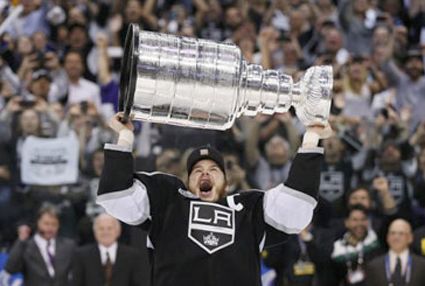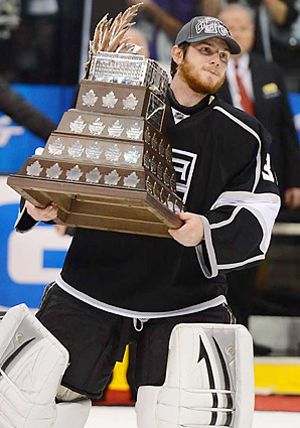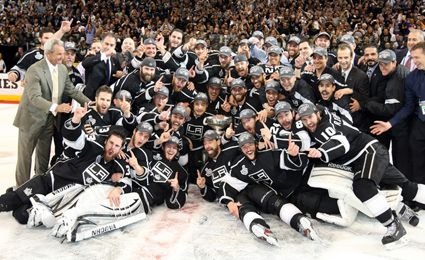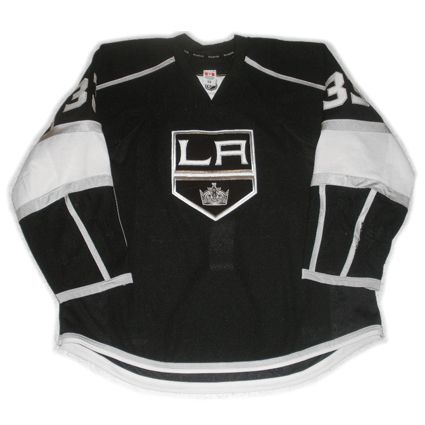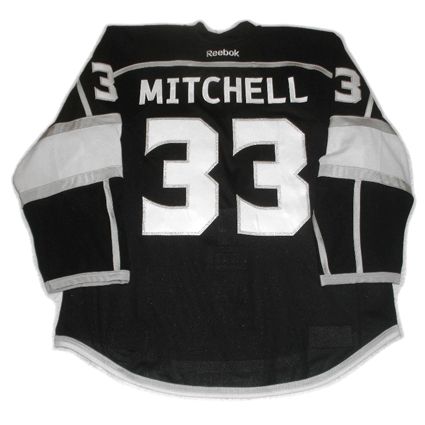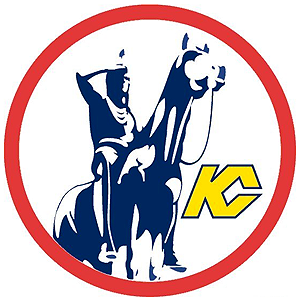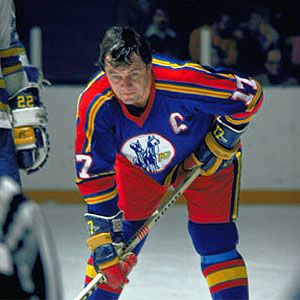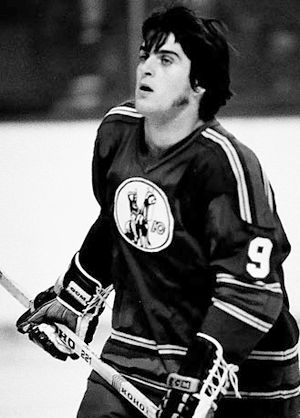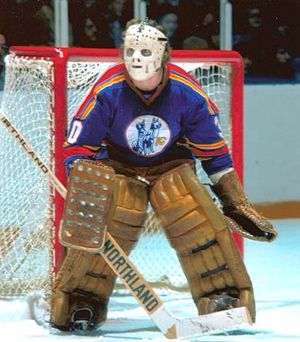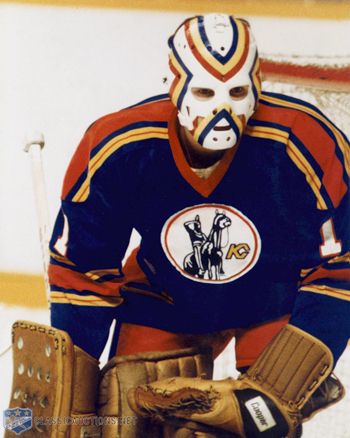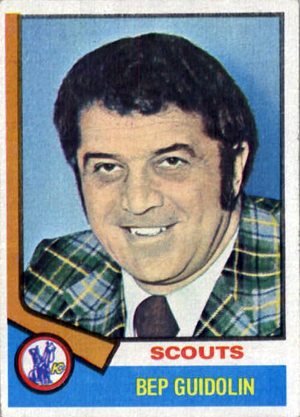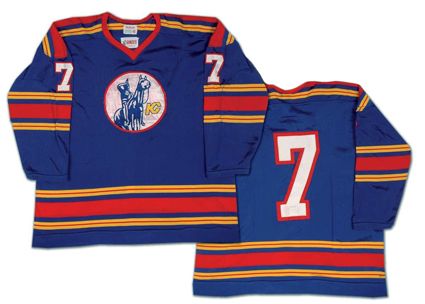Tuesday, June 12, 2012
2011-12 Los Angeles Kings Willie Mitchell Jersey
In their 45th season of play, the Los Angeles Kings captured their first Stanley Cup championship last night with a dominating 6-1 victory over the New Jersey Devils in front of their delirious home fans.
The Kings season began with a trip to Europe as part of the NHL Premiere series of opening games. After defeating the Hamburg Freezers 5-4 in an exhibition game, the Kings travelled to Stockholm, Sweden to face the New York Rangers on October 7th, kicking off their season right with a 3-2 win. They returned to Germany, this time in Berlin, where they took on the Buffalo Sabres, dropping a 4-2 decision.
They returned to North America to begin the season proper five days later with a 2-1 shootout loss to the New Jersey Devils, who would feature prominently in their season much later on. They finished October with a 6-3-2 record, which they nearly duplicated in November to reach 12-8-4.
After winning 2-1 on December 1st, the lost their next four in a row to fall to 13-12-4, which cost head coach Andy Murray his job. He was immediately replaced by John Stevens as the search for a permanent replacement began. Under Stevens, the Kings alternated losses and wins over their next four games until Darryl Sutter, who had previously coached Chicago, San Jose and Calgary, as their new, permanent coach.
The effect was swift and dramatic. The Kings scored points in 17 of their next 19 games, going 10-2-6. February though, was not kind to the Kings, who slumped rather badly, dropping eight of their next ten games before making a headline grabbing trade on February 23rd, obtaining former Philadelphia Flyer Jeff Carter from the Columbus Blue Jackets in exchange for defenseman Jack Johnson and a conditional 1st round draft pick.
Carter was unhappy in Columbus and it re-energized him to be reunited with former Flyers teammate Mike Richards. With Carter on board, goaltender Jonathan Quick playing well, the Kings began their playoff push two days later with a 4-0 blanking of the Chicago Blackhawks. A 2-1 loss to Nashville was followed by a three straight wins, but two more losses came next.
Quick won the Kings next six games to elevate Los Angeles from 74 points to 86. After losing two, they would go undefeated over their final six games, winning three and gaining a point in the other three to lock up the final place in the postseason tournament, finishing three wins and five points clear of Calgary in 9th.
Entering the playoffs as the eighth, and final qualifier in the Western Conference, the Kings were paired against the President's Trophy winning Vancouver Canucks, who didn't stand a chance after the Kings won the first two games by matching 4-2 scores in Canada. Los Angeles returned home for a 1-0 shutout by Quick to put the Canucks on the brink. Vancouver stayed alive with a 3-1 win in Game 4, but the Kings moved on with a 2-1 win in overtime of Game 5. Quick only allowed eight goals in the series' five games.
The next challenge for Los Angeles was the #2 seeded St. Louis Blues, however, the Blues were easily dispatched in four straight games with the Kings winning every game by at least two goals as they outscored St. Louis 15-6 to become the first team to defeat both the #1 and #2 seeds in the playoffs.
The Phoenix Coyotes, seed third as Pacific Division winners, were the next hurdle for the Kings, who pushed their winning streak to eight by taking the first three games from Phoenix, which also ran their road record to a perfect 7-0. After the Coyotes stayed alive with a win in Game 5, the Kings closed out the series to advance to the Stanley Cup Finals for the second time in team history with a 4-3 overtime win in Phoenix.
Amazingly, the Kings won their first two games on the road to open their fourth series in a row and extended their road winning streak to 10 games. They looked to be on the brink of a championship after a 4-0 blanking of the Devils in Game 3, but the Devils dug deep and won the next two games 3-1 and 2-1 to send the series back to Los Angeles for a sixth game, the longest series that the Kings had been involved in all postseason.
Not wanting to risk the uncertainty of a seventh game, the Kings took full advantage of an early five minute power play, scoring three times to take control. They added a fourth goal just 1:30 into the second, doing their best to let New Jersey know not to consider any thoughts of a comeback. The Devils would not solve Quick until there was 1:15 left in the second, but with the Kings having never surrendering more than 3 goals in any game of the playoffs, a Devils faced a virtually impossible task entering the third.
In desperation, they pulled goaltender Martin Brodeur with nearly 4 minutes remaining and Trevor Lewis scored to put the game out of reach. Matt Greene followed with a floater from the point just 15 seconds later to produce the final margin of victory and get the celebration underway a few minutes early.
The Kings march through the post season saw them finish with a 16-4 record and a 10-1 mark on the road, winning each series as a lower seed. Quick was named the winner of the Conn Smythe Trophy as the playoff MVP, the third American to win it after Brian Leetch (1994) and Tim Thomas (2011).
Dustin Brown became just the second American-born captain to win the cup following Derian Hatcher of the Dallas Stars back in 1999. Of note concerning nationalities, forward Anze Kopitar becomes the first Slovenian to win the cup. The Kings trip to Germany and Sweden to open the season is now the fourth year in a row the eventual cup champion has begun their season in Europe as part of the NHL Premiere Series.
Today's featured jersey is a 2011-12 Los Angeles Kings Willie Mitchell jersey. The Kings made several changes to their jerseys for 2011-12, as they promoted their silver and black alternate jersey with a shield crest to become their new primary home jersey and designating their previous purple and black home jersey adorned with a crown logo as the new alternate. They also created a new white version of their new primary jersey to be worn on the road, a jersey which made it's public debut at the 2011 NHL Draft.
The change to silver and black home and road jerseys was a return to the look the Kings employed from 1988 to 1998, which was ushered in by the arrival of Wayne Gretzky in Los Angeles.
Mitchell, a defenseman, was the second King to hoist the Stanley Cup following team captain Brown. He is a 12 year veteran of the NHL, having started his career with the Devils before moving to the Minnesota Wild, Dallas Stars and Vancouver Canucks and is the oldest player on the Kings. His 24 points this season was a career high, as was his 5 goals.
Here are the highlights of last night's Game 6 as the Kings won the Stanley Cup for the first time in franchise history.
Labels:
Los Angeles Kings
Monday, June 11, 2012
1974-75 Kansas City Scouts Guy Charron Jersey
In 1972, the World Hockey Association came into being, competing directly with the NHL for players and franchise locations. The NHL had already added the Atlanta Flames and New York Islanders in 1972, with the Islanders in particular being a deliberate expansion to occupy a location viewed as desirable by the WHA.
With the WHA having placed teams in direct competition with the NHL in Philadelphia, Boston, Los Angeles, New York, Minnesota and Chicago and taken smaller Canadian markets like Edmonton, Ottawa, Quebec and Winnipeg as their own, the competition for cities in the United States was where the NHL could use expansion as a weapon in their fight against the upstarts.
The remaining cities occupied by the WHA in 1972 were Cleveland and Houston, rounding out their original roster of 12 teams. The weak links in the WHA proved to be Philadelphia, New York and Ottawa, despite their having no direct rival in the NHL. The Philadelphia Blazers moved across the continent to take on the Canucks in Vancouver, while the New York Raiders changed owners and their name to the Golden Blades before fleeing Manhattan to become the New Jersey Knights in what was actually a suburb of Philadelphia 90 miles down the Jersey Turnpike, where they fared even worse than the Blazers, while playing in a substandard home rink.
Meanwhile, Ottawa learned absolutely nothing from the Raiders/Golden Blades about life as tenant of an NHL franchise and made the genius move to have cantankerous NHL hardliner Harold Ballard of all people become their landlord when they moved into Maple Leaf Gardens in Toronto to become the Toros!
That set the scene for the 1974-75 season. The WHA made the questionable move to add teams in Indianapolis and Phoenix as well as having the New Jersey (Philadlephia) franchise set up shop in San Diego, which suffered from the loss of it's potential rivalry with Los Angeles when the Sharks were the next team to try to go head to head with an established NHL cornerstone in Detroit when they became the Michigan Stags, lasting less than a full season.
As a countermove, the NHL expanded to occupy what it viewed as key markets, and on this date in 1974, franchises were awarded to Washington D. C. and Kansas City.
The Kansas City market had been home to a number of teams, dating back to the mid 1920's, including the Kansas City Pla-Mors of the American Hockey Association. They changed their name to the Kansas City Greyhounds in 1933 and the Americans in 1940, lasting until 1942. Other teams played in the United States Hockey League from 1945 to 1951 and the Central Hockey League from 1967 to 1972.
The Scouts were to call the brand new Kemper Arena home and were hoped to create a rivalry with their fellow Missouri residents, the St. Louis Blues. The club was originally going to be called the Mohawks, taking "Mo" from the postal abbreviation for Missouri, and "hawks" from the Kansas nickname of "Jayhawkers" in an effort to appeal to residents on both sides of the border, but the established Chicago Black Hawks protested, saying the name sounded too similar to theirs.
Thus, a name the team contest was held, which resulted in the name "Kansas City Scouts" being chosen in honor of an iconic statue named "The Scout" which overlooks downtown Kansas City from a hill in a nearby park.
The club formed their roster as best they could under the rules the expansion teams were forced to deal with, combined with the intense competition from an additional 14 WHA teams. The Scouts chose goaltender Michel Plasse, a former player with the Kansas City Blues, with their first choice in the 1974 NHL Expansion Draft. Peter McDuffe, another goaltender was chosen second and winger Simon Nolet was taken from the Philadelphia Flyers and would go on to lead the team in scoring.
Simon Nolet
The Scouts would pick second in the Amateur Draft, and chose well, taking eventual NHL All-Star Wilf Paiement. Things did not go quite so well after that, with second round pick Glen Burdon playing a total of 11 NHL games and eventual All-Star and four time Stanley Cup champion Bob Bourne, taken in the third round, being traded for Bart Crashley (2 games with the Scouts) and the rights to Larry Hornung, who played the rest of his career in the WHA, before Bourne ever played a game in Kansas City.
Wilf Paiement
Their first season began with eight games on the road to allow final completion of Kemper Arena. The brutal road trip was a dreadful way to begin life for an expansion club, as they immediately lost 7 and tied 1. After a loss in their home opener on November 2, 1974 to the Chicago Black Hawks, the Scouts finally won their first game over their expansion brothers, the Washington Capitals in Washington.
They would reach New Year's Day with a 5-26-4 record and play respectable hockey through January and February, going 9-13-4, before limping home 1-14-3 to finish next to last with 41 points, 10 back of the lowly California Seals, but 20 ahead of the moribund Capitals.
Nolet led the club in goals with 26 and assists with 32 for 58 points. Guy Charron, obtained from Detroit, was next with 42 points, while Paiement tied Nolet for the lead in goals with 26 of his own on his way to fourth, with his 39 points 2 back of Dave Hudson's 41.
In goal, Plasse lasted 24 games before packing his bags after being traded to Pittsburgh for Denis Herron, who played 22 games while McDuffe led the club in wins with 7 in 36 appearances.
Peter McDuffe
Attendance was essentially the same story, as the Scouts finished 17 out of 18 at 7,356, ahead of the Seals 6,172, the only two clubs under 10,000.
The Scouts second draft was nothing short of a failure, failing to land a single player who would play even 170 NHL games as they passed on players like Dennis Maruk, Doug Jarvis and Dave Taylor in what would prove to be an extraordinarily shallow draft that would produce just 6 All-Stars out of 217 picks.
The 1975-76 season began well enough with a 3-2-1 record before the losses began to outnumber the wins. As the calendar reached New Year's, the Scouts were 11-22-4 and on pace for 58 points, but the second half of the season was an unqualified disaster, commencing with a 14 game losing streak.
Two ties, a win and a tie gave a false flicker of hope, as the team went 0-21-6 after their final win on February 6th, their only victory in 1976.
The roster was somewhat of a revolving door, which saw a number of trades, with seven players leaving (along with a first and a pair of second round draft picks) and nine coming in, with one draft pick coming back.
Among those leaving was first year leading scorer and team captain Nolet, who was sent east to Pittsburgh. Charron, now promoted to captain, led the team with 27 goals and 44 assists for 71 points, far ahead of Paiement's 43, the only other player over 40. Also of note, Steve Durbano became a fan favorite as he led the league in penalty minutes with 209. There was turnover in goal as well, as McDuffe was out, which allowed Herron to play 64 games (winning 11), backed up by Bill McKenzie's 22, only one of which he won.
Denis Herron
During their first two seasons, the Scouts had two head coaches Bep Guidolin and Eddie Bush, three if you count Sid Abel's three game stint to bridge the gap when Guidolin was let go during the Scouts second season.
While attendance technically rose to 7,892, it still remained 17th. With the team suffering from a rapid rise in player costs, an ownership group (of thirty-seven individuals!) in debt and losing money and poor play on top of the poor attendance, 5,000 below the league average, the ownership gave it one final chance, but when a season ticket drive to raise more cash sold only 2,000 tickets, the group sold the team to interests who would immediately relocate the franchise to Denver, Colorado for the 1976-77 season, where it was renamed the Colorado Rockies, brining to and end the Scouts stay in Kansas City after an all-to-brief two seasons.
Today's featured jersey is a 1974-75 Kansas City Scouts Guy Charron jersey from the Scouts first season of play. Charron would go on to lead the Scouts in scoring not only in their second season of play, but would lead the franchise in scoring during their time in Kansas City as well.
Charron began his career in 1969-70 with the Montreal Canadiens before five seasons with Detroit before being traded to the Scouts. He would not move with the team to Denver, instead moving over to the Capitals for the final five seasons of his NHL career, which totaled 734 games.
Playing only two seasons in Kansas City did not leave much time for jersey variations, but their second season saw a yellow outline added to the crest to help it separate from the blue background better and the white home jerseys had names added during their second and final season.
photo courtesy of Classic Auctions
Today's video segment is Kansas City commentator Jack Smack lamenting the loss of the Scouts now that the New Jersey Devils, the eventual destination of the Scouts after leaving Denver, are in the Stanley Cup Finals and Kansas City's Sprint Center arena is still without an NHL or NBA tenant.
Labels:
Charron Guy,
Kansas City Scouts
Subscribe to:
Comments (Atom)

